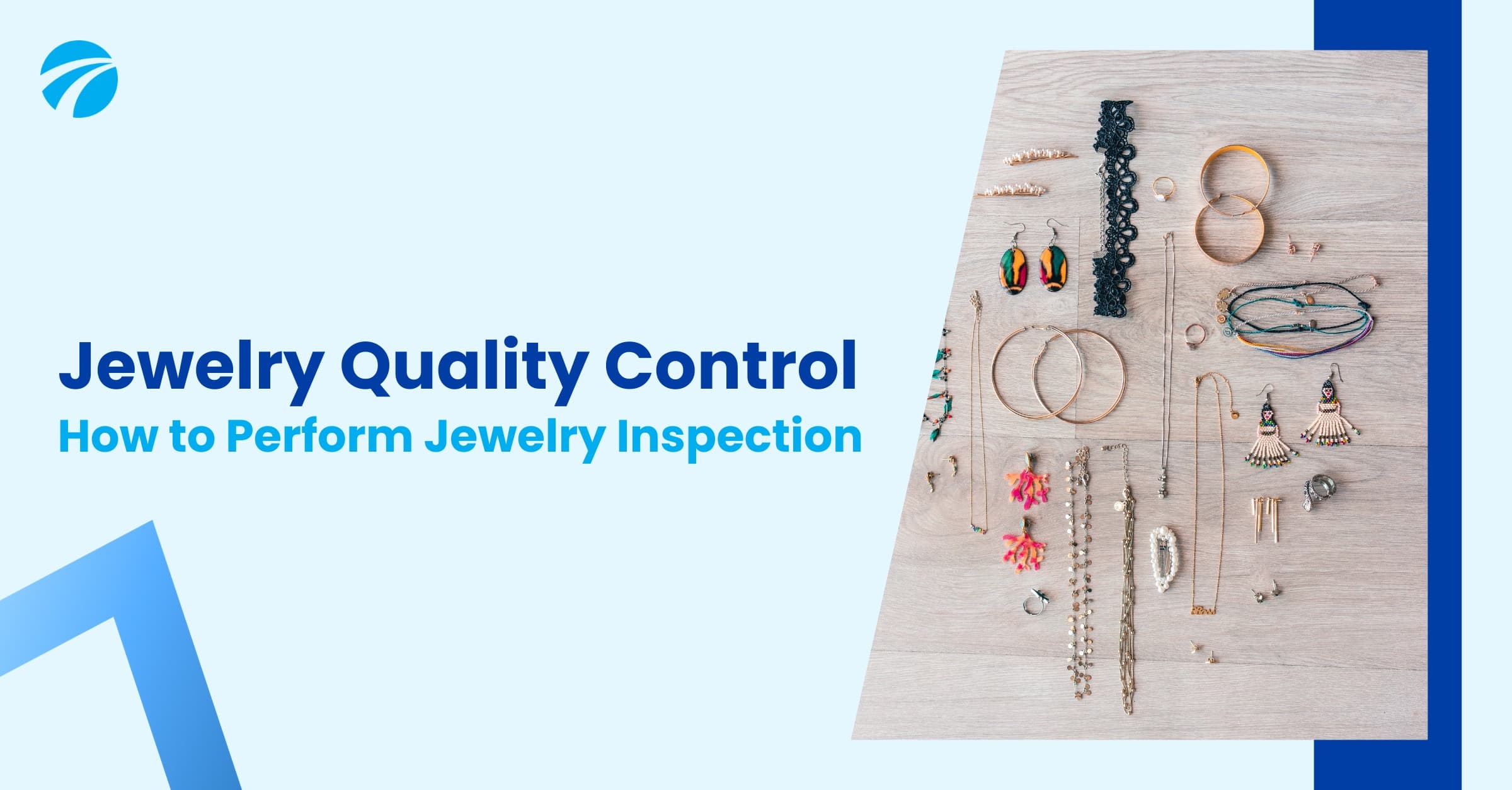Jewelry quality control involves a rigorous and meticulous product testing process to guarantee that each piece of jewelry delivered to your customers is flawless. Whether you're a jewelry brand committed to excellence or an importer in search of high-quality jewelry, understanding the nitty-gritty aspects of the jewelry inspection process is imperative.
This comprehensive guide will walk you through the stages of jewelry inspection and discuss the essential safety tests and checks that are performed to make sure your jewelry product is high-quality, safe and compliant.
Why Quality Control is Essential for Jewelry Brands
Quality control serves as the foundation upon which the jewelry industry stands, upholding the values of craftsmanship, safety, and ethics. Jewelry brands must create not only visually stunning pieces but also make sure that they are safe, durable and compliant with international standards.
Here's why quality control is essential for jewelry brands:
Meeting High-Quality Expectations
Consumers demand jewelry that is not just visually stunning but also impeccably crafted. Whether it's a piece of fine jewelry or a fashion statement, expectations for presentation and structural integrity are exceedingly high.
Ensuring Safety
Safety is paramount, given the prolonged contact jewelry has with the skin. Unsafe substances, like lead or cadmium, must be rigorously excluded to prevent health risks. Furthermore, ensuring jewelry is free from choking hazards for children is also a critical safety concern that needs to be addressed.
Upholding Ethical Responsibility
In an industry where valuable raw materials are in play, ethical behavior is imperative. Brands must steer clear of unethical practices, such as worker exploitation, unsafe mining, environmental damage, and unfair trade, to safeguard their brand image and reputation.
Jewelry Quality Control Process
The jewelry industry has seen remarkable growth, presenting both opportunities and challenges. One of the key challenges is maintaining high standards of craftsmanship, safety compliance, and ethical practices. The jewelry industry is highly competitive, and quality is scrutinized more closely than ever before. Thus, quality control stands as the cornerstone upon which trust is built, serving both discerning consumers and thriving brands.
Initial Production Inspection for Jewelry Products
The initial production check Check (IPC) takes place when the jewelry is still in its early stages of production, with only a fraction of the production process completed. Here's what tests are conducted to determine the quality of the products:
Visual Inspection
Our skilled inspectors perform a meticulous visual inspection of each jewelry piece. Their keen eyes search for any visible defects, ensuring that the initial craftsmanship aligns with your desired standards.
Component Assessment
When it comes to jewelry, every single details matter. Our highly experienced inspectors check for any misalignment of components, guaranteeing that stones, clasps, and settings sit flawlessly in place as specified in the order.
Soldering Integrity
The integrity of soldering joints is crucial for jewelry quality. Soldered connections must be flawless, devoid of gaps or imperfections, to assure the jewelry's durability.
Weight Verification
We cross-verify weight specifications to ensure that our jewelry meets the desired weight standards, reflecting both quality and value.
DUPRO Inspection for Jewelry Products
Duing Production Check (DUPRO) for Jewelry products takes place when 20-80% of production is completed. DUPRO inspections focus on maintaining consistency and addressing potential issues. Here's what happens during this phase:
Quality Consistency
Our inspectors meticulously examine each piece to ensure consistent quality throughout the production run. Craftsmanship, alignment, and materials are also closely scrutinized.
Adherence to Specifications
DUPRO inspections ensure that the jewelry adheres to the specifications outlined by the brand. This includes everything from size and weight to design details.
Production Schedule Adherence
Adhering to the production schedule is a fundamental aspect of ensuring timely and efficient production. Our inspectors play a crucial role in confirming that the production timeline is on course, safeguarding against any potential delays that could disrupt the delivery process.
Pre-Shipment Inspection (PSI) for Jewelry Products
The pre-shipment inspection services, also known as PSI, is the culmination of the jewelry quality control journey. It takes place just before the jewelry is packaged and shipped to its final destination. This is the last chance to catch any imperfections and ensure that the jewelry meets the highest standards. Here's a closer look at what transpires during this pivotal phase:
Comprehensive Visual Inspection
Every piece of jewelry undergoes a comprehensive visual examination. Inspectors leave no stone unturned, assessing each component for any flaws, scratches, or imperfections.
Workmanship Standards
The precision of workmanship is scrutinized one final time. Inspectors ensure that the jewelry meets the exacting standards set by the brand.
Packaging and Labeling
The packaging and labeling of the jewelry are examined to guarantee that they align with brand specifications as well as international labeling standards. This includes verifying that each piece is correctly labeled and packaged to prevent damage during transit.
Quantity and Quality Verification
Inspectors meticulously count and verify the quantity of jewelry items. They also conduct random sampling to assess quality, ensuring that every piece meets the desired standards.
Compliance with Regulations
Jewelry must comply with safety and regulatory standards in various markets. Inspectors ensure that the jewelry meets these requirements, safeguarding both consumers and the brand.
Types of Jewelry Tetra Inspection Inspects
Tetra Inspection specializes in the meticulous examination of various jewelry products, ensuring their quality and authenticity across a diverse range of designs and materials. From timeless classics to contemporary creations, Tetra Inspection conducts comprehensive inspections on:
- Rings
- Necklaces and Pendants
- Children's Jewelry
- Earrings
- Fashion Jewelry:
- Bracelets and Bangles
- Brooches and Pins
- Metal Jewelry:
- Watches
- Custom and Bespoke Jewelry
Key Tests We Perform for Jewelry Products Quality Control
Ensuring the quality and craftsmanship of jewelry is a critical aspect of the jewelry industry. To meet the exacting standards of discerning customers, comprehensive quality control measures are essential. We rigorously perform a series of tests, ranging from visual inspections to durability assessments, to ensure that every piece of jewelry products meets the highest standards of excellence:
- Visual Inspection
- Workmanship assessment
- Weight Verification
- Dimension check
- Small parts check
- Clasp Functionality Testing
- Soldering Integrity Check
- Plating Thickness Measurement
- Tensile Strength Testing (for chains)
- Scratch and Abrasion Resistance Testing
- Enamel or Inlay Quality Assessment
- Acid and Chemical Resistance Testing
- Ultrasonic Cleaning Test
- Magnetic Attraction Test (for ferrous metals)
- Hallmark Verification (for authenticity)
- Packaging Inspection
Common Defects Found During Jewelry Inspection
During jewelry inspection, inspectors are trained to identify various common defects to ensure the final product meets quality standards. Here are some typical defects that inspectors look for:
Visible Scratches or Surface Imperfections: Inspectors examine the jewelry's surface for scratches, dents, or any blemishes that might affect its appearance.
Stone Irregularities: Gemstones should be free from cracks, chips, or inclusions that could diminish their value or structural integrity.
Soldering Flaws: Inspectors check for soldering defects such as incomplete joints, gaps, or excess solder that can compromise the jewelry's durability and aesthetics.
Metal Discoloration: Any signs of tarnish or discoloration on metal components are noted, as this can impact the overall appearance.
Gemstone Setting Issues: Stones must be securely set without any wobbling or misalignment. Loose stones or settings can lead to loss or damage.
Clasp and Fastener Issues: Clasps, closures, and fasteners must work smoothly and securely. Any defects in these components could lead to jewelry loss.
Inaccurate Weight: Inspectors verify that the jewelry's weight matches the specified standards. Deviations can affect the perceived value.
Missing or Misplaced Components: All components, including stones, findings, and decorative elements, should be present and correctly positioned in the jewelry piece.
Poor Polishing and Finishing: The overall finish of the jewelry is assessed. Any uneven polishing, rough edges, or unfinished areas are considered defects.
Design Inconsistencies: If the jewelry is part of a set or series, inspectors check for design consistency to ensure that all pieces match in style and appearance.
Metal Purity and Hallmarks: The metal's purity is verified, and hallmarks are checked to confirm that the jewelry meets regulatory requirements.
Incorrect Sizing: Rings, bracelets, and necklaces must conform to specified size standards to ensure a comfortable fit for the wearer.
Allergenic Materials: Inspectors check for the presence of allergenic materials like nickel, ensuring compliance with safety regulations.
Packaging and Labeling Errors: Any issues with packaging, labeling, or documentation are noted to ensure the jewelry is correctly identified and presented.
Laboratory-Based Jewelry Testing
While not an integral part of the manufacturing process, laboratory-based product testing plays a pivotal role in ensuring that jewelry products meet safety regulations and stringent quality criteria before they enter the market.
Types of Laboratory Tests for Jewelry
Laboratory tests encompass mechanical and physical assessments, including tension and torque resistance, sharpness evaluations, and small parts checks.
On the other hand, through chemical tests, critical aspects of jewelry products such as plating thickness, gold and silver verification, corrosion resistance, dye content, cadmium and lead levels, nickel release, and the presence of substances of very high concern (SVHC) are determined.
Standards Applicable for Jewelry Quality Control
International Organization for Standardization (ISO): ISO has developed standards related to jewelry quality control, such as ISO 11426 for gemstone identification and ISO 11427 for gemstone grading.
Jewelry Industry Ethical Standards: Various organizations, such as the Responsible Jewellery Council (RJC), establish ethical standards for the jewelry industry, addressing issues like responsible sourcing of materials and labor practices.
European Union (EU) REACH Regulations: REACH regulations in the EU address the use of certain chemicals and substances in jewelry production to protect consumer health and the environment.
ASTM International Standards: ASTM has developed numerous standards related to jewelry, covering aspects like testing methods for gemstones, metals, and materials used in jewelry production.
Jewelry Appraisal Standards: Appraisal organizations, such as the International Society of Appraisers (ISA), provide guidelines and standards for jewelry appraisal to ensure accurate valuation.
Customs and Tariff Regulations: Import and export regulations for jewelry can vary by country, and compliance with customs and tariff codes is essential for international trade.
How Tetra Inspection's Expertise in Jewelry Quality Control.
Tetra Inspection is a leading jewelry quality control inspection services provider, ensuring your products meet the highest standards.
Our highly experienced inspectors meticulously assess each piece, guaranteeing flawless craftsmanship, safety, and compliance with your jewelry products.
With our in-depth industry knowledge and rigorous testing, your jewelry brand's reputation is in safe hands. Contact us today for comprehensive Jewelry Quality Control.
Schedule a Jewelry Inspection Today
Minimize risks, uphold quality, and ensure that your jewelry products comply with the highest industry standards.
Tetra Inspection
Quality control experts at Tetra Inspection, helping businesses protect their supply chains with reliable inspection services across 45+ countries worldwide.
Need Help With This?
Our inspectors handle this across 45+ countries with 48-hour scheduling.
Get Inspection Insights
Monthly quality tips and industry data.




